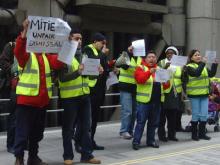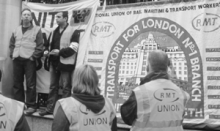From 7pm on the evening of Tuesday June 9th until 7pm on Thursday June 11th 2009, London Underground workers in the Rail, Maritime and Transport (RMT) union took strike action. The main issue was job security as tube bosses flatly refused to rule out compulsory redundancies, putting 4,000 jobs at risk. London Underground originally also tried to force through a five-year pay agreement which could see significant pay cuts linked to deflation. This, alongside severe management bullying, led the workers to strike.
As the strike began, the London papers really pushed the boat out using distortions and outright lies to attack the striking workers. Claims of workers demanding 5% pay increases ignored the fact that management asked the RMT to submit a pay claim in November (when inflation was higher) while Transport for London have yet to offer anything. These sleight-of-hand tricks with the facts were coupled with barefaced lies like talks stalling over two sacked drivers on the Victoria line. This entirely separate issue, though symptomatic of wider abuses of procedure on the tube, were at no point a part of the main negotiations.
Of course, the papers also failed to mention the 123 tube managers on £100,000+ salaries, plus bonuses. Or that forty minutes before the strike, an agreement had been reached which, while the documents were being typed up, was cancelled by City Hall. These facts disappeared from media view entirely.
The theme of the media coverage was one of trying to stoke resentment against the strikers. Newspaper letters pages were filled with angry comments about ‘people losing their jobs while tube staff want more money’. We’re in recession now so we all have to tighten our belts, apparently. However, this just means that workers will be asked to tighten our belts, while our bosses continue living on six-figure salaries. Tightening our belts now doesn’t mean bosses will reward this good will in the future, rather they will see it as an opportunity for further attacks.
Rather than resent the tube workers’ struggle for jobs, conditions and pay, we should see it as a source for inspiration. As the recession continues, many of us will face similar attacks as bosses try to save money while saving their own salaries. Taking action together, like workers did on the Underground, will be the only way to protect ourselves from these attacks.

